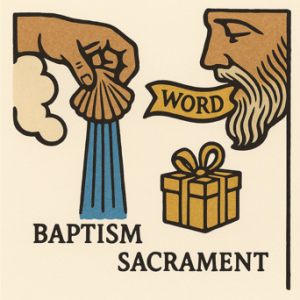 The Lutheran Church—Missouri Synod (LCMS) deliberately distinguishes itself from “decisional theology” churches (such as many Baptist, Pentecostal, and evangelical traditions). The key difference comes down to how salvation is received and the role of human will in conversion.
The Lutheran Church—Missouri Synod (LCMS) deliberately distinguishes itself from “decisional theology” churches (such as many Baptist, Pentecostal, and evangelical traditions). The key difference comes down to how salvation is received and the role of human will in conversion.
1. LCMS Position: Monergism (God Alone Works Salvation)
- The LCMS is in the category of monergistic churches (“mono” = one, “ergon” = work).
- This means God alone works faith in the sinner’s heart through the means of grace (Word and Sacraments).
- LCMS teaches that people are by nature spiritually dead (Eph. 2:1). Therefore, they cannot cooperate in their conversion or “decide for Christ.”
- Faith itself is a gift of God (Eph. 2:8–9, 1 Cor. 12:3).
- Baptism, preaching, and the Lord’s Supper are God’s chosen means to deliver and sustain this gift.
2. Decisional Theology Position: Synergism (God + Man)
- Churches that teach “decisional theology” fall into the category of synergistic churches (“syn” = with, “ergon” = work).
- They believe that Christ has made salvation available to all, but that it only becomes effective when a person makes a free-will decision (such as “accepting Christ,” “praying the sinner’s prayer,” or “coming forward at an altar call”).
- Faith, in this framework, is partly a human act — a choice to receive Jesus.
- This theology emphasizes human responsibility to respond, sometimes suggesting that without a conscious act of the will, salvation cannot be applied.
3. Why the LCMS Rejects Decisional Theology
- The LCMS argues decisional theology:
- Undermines grace by making salvation partly dependent on human action.
- Contradicts Scripture (John 15:16 – “You did not choose Me, but I chose you”).
- Gives uncertain assurance, because believers may wonder if their decision was sincere enough or if they truly believed hard enough.
- Instead, the LCMS emphasizes assurance in God’s promise and objective means — baptism, absolution, the Gospel — not in the quality of one’s decision.
✅ In summary:
The LCMS puts itself in the monergistic camp (God alone brings about conversion through Word and Sacraments), while decisional theology churches fall into the synergistic camp (God offers salvation, but man must “decide” to make it real).
